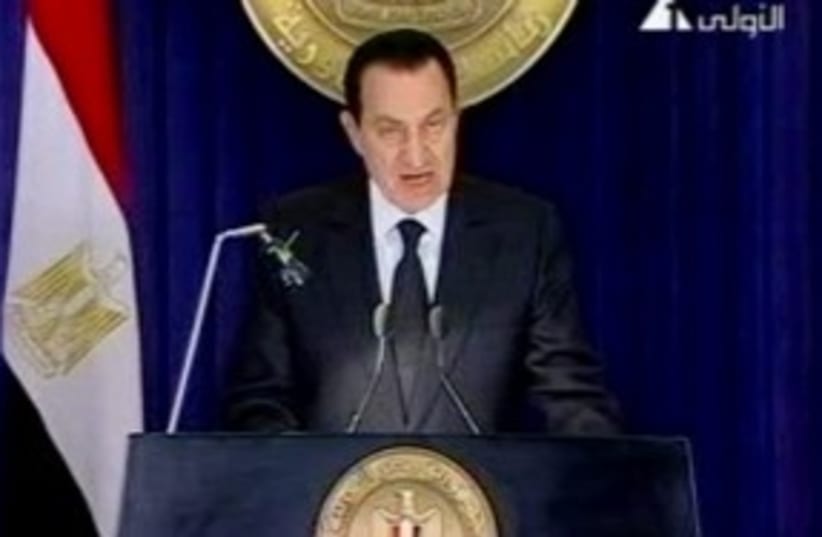Mubarak: "Adamant to continue"In his address on state TV, Mubarak showed the strategy he has followed throughout the days of upheaval, trying to defuse the greatest challenge ever to his nearly three-decade authoritarian rule. So far, he has made a series of largely superficial concessions while resolutely sticking to his refusal to step down immediately or allow steps that would undermine the grip of his regime.Looking frail but speaking in a determined voice, Mubarak spoke as if he were still in charge, saying he was "adamant to continue to shoulder my responsibility to protect the constitution and safeguard the interests of the people." He vowed that he would remain in the country and said he was addressing the youth in Tahrir as "the president of the republic."Even after delegating authority to his vice president, Mubarak retains his powers to request constitutional amendments and dissolve parliament or the Cabinet. The constitution allows the president to transfer his other authorities if he is unable to carry out his duties "due to any temporary obstacle.""I saw fit to delegate the authorities of the president to the vice president, as dictated in the constitution," he said.Suleiman was already leading the regime's efforts to deal with the crisis, though he has failed to ease the protests, which have only escalated in size and ambition, drawing crowds of up to a quarter-million people. In the past 48 hours they have spiraled even further out of control, with labor protests erupting around the country and riots breaking out as impoverished Egyptians attacked and set fire to several police and governor headquarters in cities outside Cairo.
Egypt's Mubarak stays in post, hands powers to VP
Protesters warn country could explode in violence, plead for military to take action; ElBaradei also calls on army to interfere.

Mubarak: "Adamant to continue"In his address on state TV, Mubarak showed the strategy he has followed throughout the days of upheaval, trying to defuse the greatest challenge ever to his nearly three-decade authoritarian rule. So far, he has made a series of largely superficial concessions while resolutely sticking to his refusal to step down immediately or allow steps that would undermine the grip of his regime.Looking frail but speaking in a determined voice, Mubarak spoke as if he were still in charge, saying he was "adamant to continue to shoulder my responsibility to protect the constitution and safeguard the interests of the people." He vowed that he would remain in the country and said he was addressing the youth in Tahrir as "the president of the republic."Even after delegating authority to his vice president, Mubarak retains his powers to request constitutional amendments and dissolve parliament or the Cabinet. The constitution allows the president to transfer his other authorities if he is unable to carry out his duties "due to any temporary obstacle.""I saw fit to delegate the authorities of the president to the vice president, as dictated in the constitution," he said.Suleiman was already leading the regime's efforts to deal with the crisis, though he has failed to ease the protests, which have only escalated in size and ambition, drawing crowds of up to a quarter-million people. In the past 48 hours they have spiraled even further out of control, with labor protests erupting around the country and riots breaking out as impoverished Egyptians attacked and set fire to several police and governor headquarters in cities outside Cairo.